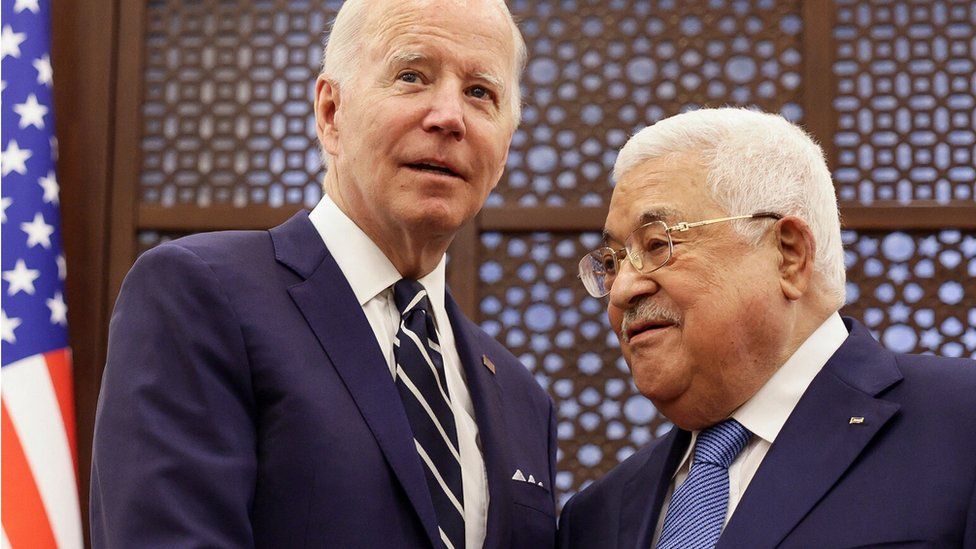Biden offers Palestinians warm words but deep rift remains
- Published

The US President Joe Biden came to Bethlehem with sympathy, strong rhetoric on the need for peace between Israel and the Palestinians but no prospect of a political breakthrough.
At a longer than expected meeting with the Palestinian president in the occupied West Bank, he restated his long-time commitment to the idea of creating an independent state of Palestine.
But he said that the ground was "not right at this moment" to restart peace talks.
In response, the 86-year-old Palestinian leader, Mahmoud Abbas said the chance for a two-state solution to the Israel-Palestinian conflict "may not remain for a long time."
Washington has been trying to mend ties with the Palestinians, which were broken under the last US administration, and has restored some funding. On this presidential trip, it has announced plenty of economic aid and other support, such as the creation of a 4G phone service.
Mr Biden began the day at the Augusta Victoria Hospital on the Mount of Olives, part of Israeli-annexed East Jerusalem, which has never been visited by a sitting president before.
He told medical staff that he brought "a message of hope".
President Biden: "Palestinian people deserve a state of their own"
Washington is giving $100m (99m euros; £85m) to help the Palestinian hospital, which is the main cancer treatment centre for patients from the West Bank and Gaza Strip, and five others nearby.
There was symbolic significance to the location after the US - under President Trump - recognised Jerusalem as Israel's capital, without acknowledging Palestinian claims to East Jerusalem, which they want as the capital of their hoped-for future state.
'Palestinians are hurting'
From Jerusalem, it took the president's long motorcade of black, armoured vehicles about 15 minutes to reach Bethlehem, crossing through an Israeli checkpoint.
Mr Biden drove past a mural of the late American-Palestinian Al Jazeera correspondent, Shireen Abu Aqla, painted on the 8m (26ft) high concrete wall that hems in the holy city - part of Israel's West Bank barrier.
(July 2022) Shireen Abu Aqla's brother Tony (left): "It is very hard to live without her"
Her family has been calling for an independent investigation into her death after the US accepted that she was likely to have been killed by an Israeli soldier while covering an Israeli military raid in Jenin in May.
In stark contrast to the luxury hotels where the president has stayed and met Israeli officials in recent days, his limousine raced by overcrowded Palestinian refugee camps.
Signs put up by an Israeli anti-occupation NGO, B'Tselem, read: "This is apartheid, Mr President" - a label that Israeli and US authorities strongly reject.
At the local presidential headquarters, there was a formal reception with a red carpet and an honour guard.
After private talks, the two men emerged calling each other "a dear guest" and "a friend".
Mr Biden spoke sympathetically of the daily "indignities" that Palestinians face living under Israeli occupation, saying that "Palestinian people are hurting now".
However, it was clear that deep differences between the leaders remain.
This Middle East visit has shown how the US is trying to strengthen Israel's new alliances with Arab countries and promote its "regional integration", building military partnerships to help counter the threat from Iran.
Despite Washington's denials, Palestinians see this as a betrayal of their cause. Twenty years ago, the Saudi-led Arab peace initiative promised Israel recognition from other Middle Eastern countries only after the creation of a Palestinian state.
There have been Palestinian protests against the Biden visit in the West Bank and Gaza, with activists saying the US is not an honest broker.
"He's clearly here for one cause only: to help the Israelis, not the Palestinians," said Jude Salhi in Ramallah.
'Off the table'
A two-state solution - with the creation of an independent Palestine, alongside the existing state of Israel - has long been the formula for peace favoured by the international community.
But it has appeared increasingly unlikely in recent years and the US assesses that neither side is ready for the high stakes talks that would be needed to solve outstanding thorny issues.
The Palestinian leadership is split between the PA, controlling parts of the West Bank, and the militant group, Hamas which governs Gaza. At the same time there has been a right-wing drift in Israeli politics and the country has been locked in a series of inconclusive elections for the past three years, meaning it has not had a stable government.
"When we hear the American administration, including the president saying 'two-state solution', everybody makes, you know, kind of a smile," Times of Israel political correspondent, Tal Scheider, tells me.
"What two-state solution? It's completely off the table here in Israel."
But ordinary Palestinians - who see the possibility for a state of their own shrinking with the expansion of Jewish settlements - are deeply frustrated. Maria Canawati runs a coffee shop near to the Nativity Church which was visited by President Biden.
"I'm not expecting anything from [President Biden]. He is just going to visit the church and other places and he's going to leave," she said beforehand. "It's not good enough. I want peace."
Related Topics
- Published15 July 2022
- Published14 June 2022
- Published14 July 2021